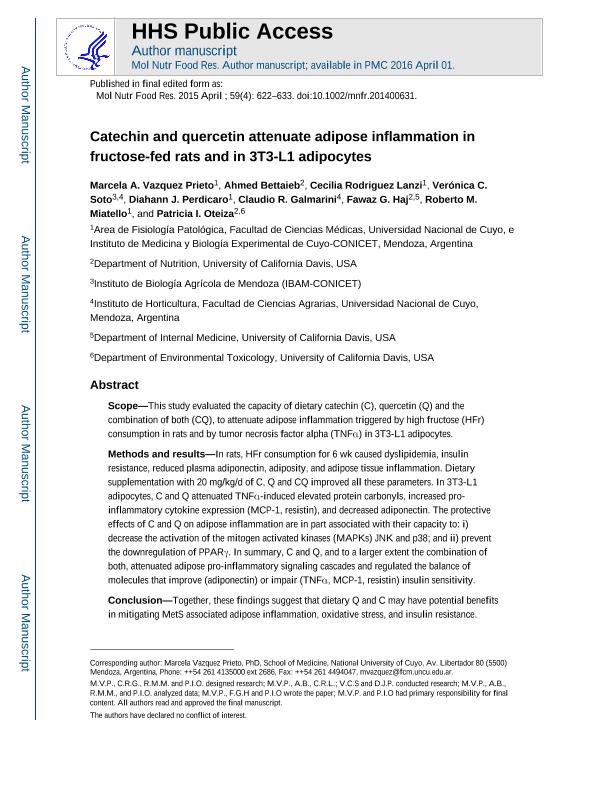Artículo
Catechin and quercetin attenuate adipose inflammation in fructose-fed rats and 3T3-L1 adipocytes
Vazquez, Marcela Alejandra ; Bettaieb, Ahmed; Rodriguez Lanzi, Maria Cecilia
; Bettaieb, Ahmed; Rodriguez Lanzi, Maria Cecilia ; Soto Vargas, Verónica Carolina
; Soto Vargas, Verónica Carolina ; Perdicaro, Diahann Jeanette
; Perdicaro, Diahann Jeanette ; Galmarini, Claudio Romulo
; Galmarini, Claudio Romulo ; Haj, Fawaz G.; Miatello, Roberto Miguel
; Haj, Fawaz G.; Miatello, Roberto Miguel ; Oteiza, Patricia Isabel
; Oteiza, Patricia Isabel
 ; Bettaieb, Ahmed; Rodriguez Lanzi, Maria Cecilia
; Bettaieb, Ahmed; Rodriguez Lanzi, Maria Cecilia ; Soto Vargas, Verónica Carolina
; Soto Vargas, Verónica Carolina ; Perdicaro, Diahann Jeanette
; Perdicaro, Diahann Jeanette ; Galmarini, Claudio Romulo
; Galmarini, Claudio Romulo ; Haj, Fawaz G.; Miatello, Roberto Miguel
; Haj, Fawaz G.; Miatello, Roberto Miguel ; Oteiza, Patricia Isabel
; Oteiza, Patricia Isabel
Fecha de publicación:
24/01/2015
Editorial:
Wiley VCH Verlag
Revista:
Molecular Nutrition & Food Research
ISSN:
1613-4125
Idioma:
Inglés
Tipo de recurso:
Artículo publicado
Clasificación temática:
Resumen
Scope: This study evaluated the capacity of dietary catechin (C), quercetin (Q), and the combination of both (CQ), to attenuate adipose inflammation triggered by high fructose (HFr) consumption in rats and by tumor necrosis factor alpha (TNF-α) in 3T3-L1 adipocytes. Methods and results: In rats, HFr consumption for 6 wk caused dyslipidemia, insulin resistance, reduced plasma adiponectin, adiposity, and adipose tissue inflammation. Dietary supplementation with 20 mg/kg/day of C, Q, and CQ improved all these parameters. In 3T3-L1 adipocytes, C and Q attenuated TNF-α-induced elevated protein carbonyls, increased proinflammatory cytokine expression (MCP-1, resistin), and decreased adiponectin. The protective effects of C and Q on adipose inflammation are in part associated with their capacity to (i) decrease the activation of the mitogen-activated kinases (MAPKs) JNK and p38; and (ii) prevent the downregulation of PPAR-γ. In summary, C and Q, and to a larger extent the combination of both, attenuated adipose proinflammatory signaling cascades and regulated the balance of molecules that improve (adiponectin) or impair (TNF-α, MCP-1, resistin) insulin sensitivity. Conclusion: Together, these findings suggest that dietary Q and C may have potential benefits in mitigating MetS-associated adipose inflammation, oxidative stress, and insulin resistance.
Archivos asociados
Licencia
Identificadores
Colecciones
Articulos(CCT - MENDOZA)
Articulos de CTRO.CIENTIFICO TECNOL.CONICET - MENDOZA
Articulos de CTRO.CIENTIFICO TECNOL.CONICET - MENDOZA
Articulos(IBAM)
Articulos de INST.DE BIOLOGIA AGRICOLA DE MENDOZA
Articulos de INST.DE BIOLOGIA AGRICOLA DE MENDOZA
Articulos(IMBECU)
Articulos de INST. DE MEDICINA Y BIO. EXP. DE CUYO
Articulos de INST. DE MEDICINA Y BIO. EXP. DE CUYO
Citación
Vazquez, Marcela Alejandra; Bettaieb, Ahmed; Rodriguez Lanzi, Maria Cecilia; Soto Vargas, Verónica Carolina; Perdicaro, Diahann Jeanette; et al.; Catechin and quercetin attenuate adipose inflammation in fructose-fed rats and 3T3-L1 adipocytes; Wiley VCH Verlag; Molecular Nutrition & Food Research; 59; 4; 24-1-2015; 622-633
Compartir
Altmétricas



